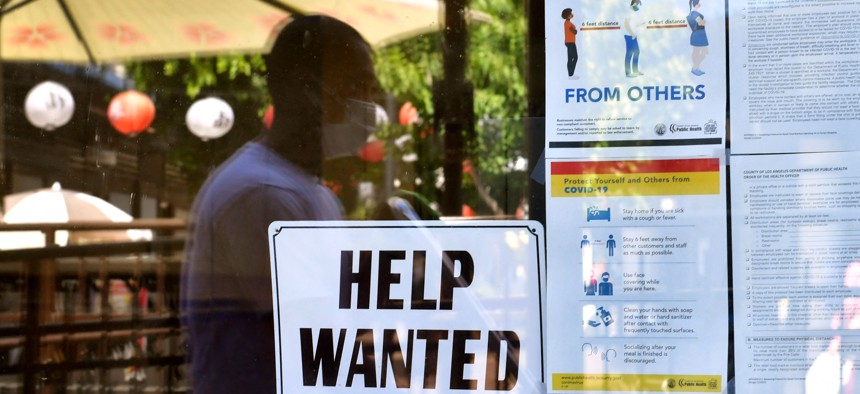Connecting state and local government leaders
The perk is part of new Republican legislation meant to force states to pursue more of the billions of dollars in benefits they wrongly paid during the pandemic.
Senate Republicans critical of the Labor Department’s decision earlier this year to excuse states from going after improper unemployment payments proposed a bill on Thursday that would rescind the waiver.
But, in a twist, the GOP lawmakers also want to give a new perk to states that recover the money, allowing them to keep a fourth of that cash instead of returning it all to Washington.
“Taxpayer dollars that were meant to help out-of-work Americans instead went to criminals and cheats,” Sen. Rob Portman of Ohio, the top Republican on the Homeland Security and Governmental Affairs Committee, said in a statement. “This legislation will give the states the incentives and tools necessary to recover this stolen money.”
Portman is sponsoring the proposal with Sen. Mike Crapo of Idaho, the top Republican on the Finance Committee. Rep. Kevin Brady, the top Republican on the House Ways and Means Committee, proposed an identical bill in June.
“State workforce agencies currently have little incentive to go after fraud. States must pay up-front costs of hiring investigators and prosecution but can’t retain any of the dollars recovered,” a House Republican summary of the bill said.
The move comes after even the White House has acknowledged that billions of dollars in increased unemployment benefits given out as part of Covid-19 relief packages, were wasted due to fraud, people receiving more money than they should have, and payments mistakenly made to ineligible recipients.
The White House has put the amount of improper payments at $80 billion, but the Labor Department’s Inspector General has pegged it at more than twice that—$163 billion.
According to the Labor Department, a big part of the problem is that state unemployment departments were overwhelmed by a flood of additional people seeking benefits during the pandemic, as well as confusion over new rules Congress created.
“There was a significant number of state errors and inaccuracies due to these fast-changing circumstances,” the Labor Department acknowledged in February guidance.
But it noted that, according to the Census Bureau, increasing the amount of benefits and allowing more people to receive help “kept 4.7 million people from being in poverty during 2020, decreasing poverty across all racial groups and all age groups.”
In an exclusive interview with Route Fifty shortly after the guidance was released, Michele Evermore, deputy policy director for Labor’s Office of Unemployment Insurance Modernization, said a common reason for overpayments was that the amount an unemployed person receives is based on their net pay after taxes. But in applying for benefits, some people, confused about what that meant, reported their higher-gross, before-tax pay, which resulted in them receiving more money than they should have.
Evermore said the department granted states blanket waivers in tracking down improper payments in some cases in response to problems states faced. For example, some states were excused from tracking down improper payments that were made due to no fault of the benefit recipient or the state.
In addition, Evermore said the department didn’t want to cause greater hardship for people already struggling during the pandemic by making them pay back money they had received through no fault of their own.
“People panicked. There were people selling their houses, selling their cars, dipping into their 401(k)s. We’ve heard anecdotally of people taking their own lives because of this,” Evermore said.
The department, though, did not excuse states from trying to track down cases in which they suspected fraud, which also has grown and often involves sophisticated networks based in places like Nigeria, Russia and Eastern Europe.
Evermore insisted the Labor Department has been working to reduce fraud, citing $240 million in grants it announced last August to help states bolster fraud detection and prevention efforts.
She also noted that the department had dispatched “tiger teams” to 18 states to assess and recommend ways to stop unemployment fraud.
But by easing the pressure on states to go after all improper payments, Republicans worry the Biden administration has increased the chances that more people will get away with defrauding the system, leading to more wasted tax dollars.
In February, Republicans on the House Ways and Means Committee wrote in a letter to Rep. Richard Neal, the committee's Democratic chairman, that excusing states from getting back improper payments lets them “off the hook for due diligence and fact-finding for large volumes of suspicious unemployment claims potentially involving billions of fraudulently obtained taxpayer dollars.”
Under the newly introduced bill, Congress would rescind the Labor Department waiver and require states to try to get the improper payments back from people. But it would also impose new requirements on states, including matching unemployment claims with a fraud alert center that can identify people claiming benefits in multiple states and using the National Directory of New Hires and the Department of Labor state Information exchange system to verify employment and prior earnings.
As an incentive for states to increase staff and modernize their unemployment systems to detect fraud, the bill would also allow them to keep 25% of the money they recover. Five percent would have to be used to increase program integrity.
It’s unclear how states feel about the proposal. Officials at the National Governors Association and the National Conference of State Legislatures were not immediately available for comment. House and Senate Democrats and the Labor Department did not have a comment.
Kery Murakami is a senior reporter for Route Fifty.
NEXT STORY: What They Do For Fun: The Hobbies of Florida Lawmakers




